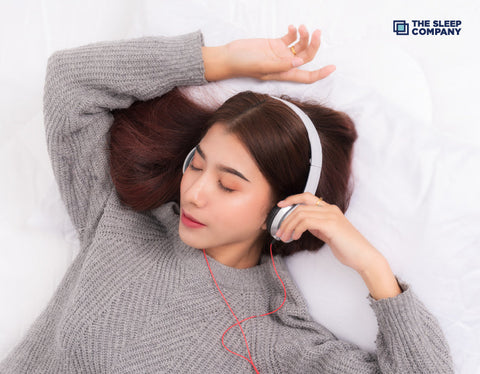My Cart

Is 6 Hours Of Sleep Enough For A Student?

Almost 40% of students in India are sleep-deprived, and the reasons for this are plenty. From late-night scrolling to last-minute cramming or rushing to complete assignments, sleep, at times, takes a backseat in a student's life.
While these habits may seem productive or can be entertaining, sleeping less can have adverse effects. Short sleep cycles can negatively affect energy levels, cognitive performance, and overall well-being.
When this issue persists, it can lead to a dip in your academic performance and give rise to health issues as well. That's why students need 8-10 hours of sleep every night to recharge. So, is 6 hours of sleep enough for a student? The simple answer is no. But let's understand more ahead.
Is 6 Hours Of Sleep Enough For A Student?
As aforementioned, 6 hours of sleep is not enough for a student. Infact, if you ask, is 6 hours of sleep enough for adults? Even here the answer is no!
Students need anywhere between 8 to 10 hours of quality sleep every night for the brain and body to function properly. Cutting sleep short once or twice may not have a major impact. But when this becomes a regular habit, it can make it harder to concentrate, remember things, and stay energized.
Over time, the effects of less sleep are seen on both mental and physical health and even academic performance. Even adults need a minimum of 7 to 9 hours of sleep each night.
The Difference Between Sleep Quality and Sleep Quantity
When we talk about sleep, it's not just about the number of hours. Instead, the quality of your sleep also matters. You must have, at times, experienced that despite snoozing for 7 to 8 hours, you end up waking up tired and groggy. This can be due to poor quality of sleep.
Frequent wakings or extreme tossing and turning through the night can hamper your sleep quality. Therefore, as a student, you must not only strive to achieve the right quantity of sleep but must ensure you enjoy deep and uninterrupted rest.
What Happens When You Sleep For Only 6 Hours?

Let’s dig deep and understand more about the consequences of sleeping for less than 6 hours as a student.
1. Cognitive Functions Take A Hit
If you are still pondering is it enough to sleep 6 hours?’ Well, let's tell you again, it is not. When you sleep for only 6 hours or less, your brain doesn’t have enough time to rest and recharge.
This leads to difficulty concentrating, affects memory, and leads to slower reaction times. You may also struggle with simple academic and everyday tasks.
2. Can Impact Your Quality of Life
When you keep getting less than 8 hours of sleep each night, you are setting yourself up for a lower quality of life. This is because sleep plays a very important role when it comes to your overall health and well-being. From your mood to productivity and even relationships, proper sleep takes care of it all.
And, when sleep deprivation turns chronic, it prevents you from living your life to the fullest.
3. Tend To Feel Irritable
Not getting enough quality sleep has a direct impact on your mood. It can make you feel cranky and moody and can cause emotional fluctuations.
Even small issues may feel like big problems. And, stress also enters the equation. If sleep deprivation becomes a regular thing, it can have a negative impact on your mental health.
4. Can Create Problems In Your Relationships
When you are constantly sleep-deprived, you may feel too tired or moody to engage in social activities. This can lead to strained relationships and a lack of energy to spend quality time with friends or family. So, soon you may feel left out or even lonely.
5. Long-Term Health Issues
Less sleep is associated with health risks like high blood pressure, heart disease, and diabetes. It also weakens your immune system, so you become more susceptible to illnesses.
When sleep deprivation becomes a regular issue, it can lead to long-term chronic health conditions as well.
6. Can Cause Anxiety or Stress
Sleep deprivation messes with your mental health. It increases the production of stress hormones, which can cause anxiety or make it worse.
You may also find it harder to cope with everyday stress, which can lead to a constant state of worry or tension.
What’s The Recommended Sleep Quantity?
The below table can help you understand how much sleep you need based on your age.
| Age Group | Recommended Sleep Duration |
|---|---|
| Newborn (0-3 months) | 14-17 hours |
| Infant (4-11 months) | 12-15 hours |
| Toddler (1-2 years) | 11-14 hours |
| Preschool (3-5 years) | 10-13 hours |
| School-age (6-13 years) | 9-11 hours |
| Teen (14-17 years) | 8-10 hours |
| Young Adult (18-25 years) | 7-9 hours |
| Adult (26-64 years) | 7-9 hours |
| Older Adult (65+ years) | 7-8 hour |
How To Get Enough Sleep?

Here are a few ways you can get enough sleep effortlessly!
1. Build A Comfortable Sleep Environment
Now you know the answer to the question, 'Is 6 Hours Of Sleep Enough For A Student?' However, how do you ensure you can get enough sleep each night? Well, building a comfortable sleep environment takes precedence.
It all starts with a supportive mattress and pillows that can offer you the comfort you deserve. They ensure you snooze peacefully without any aches or stiffness and wake up with a smile on your face.
Also, keep your room cool and dark. If necessary, use blackout curtains. You can even add calming elements like soft lighting or relaxing scents to help. A comfy environment makes it easier to relax and drift off to sleep.
2. Maintain A Proper Sleep Schedule
The next crucial step to get enough sleep is to create a sleep schedule. It's always best to go to bed and wake up simultaneously. Make sure you do this even on the weekends. This trains your body to fall asleep without fuss and wake up easily.
Over time, this routine tweaks the body's internal clock and gives you better sleep quality.
3. Avoid Screen Before Bed
Since we live in a tech-savvy era, it is quite common to see children and students spending time on their phones and computers. However, make sure you avoid this before bed.
The blue light from your electronics can trick your brain into staying awake for a little longer. Therefore, shut down all electronics at least an hour before bed. You can use this time to cultivate stress-relieving habits like reading a book, meditation, or listening to soothing music.
See which activity calms you down and helps you unwind easily. Even something as simple as journaling can be therapeutic.
4. Proper Time Management Is Essential
One of the main reasons why students get less sleep is missed deadlines. Sometimes, having an assignment due or preparing for an exam at the last minute makes you sacrifice sleep.
This is why you must inculcate proper time management skills from a young age. Make sure you avoid procrastination and finish all your tasks on time. Remember, if you are facing any difficulty, it's always better to ask for some help. Don't miss out on sleep. A good night's rest keeps your energy levels up during the day.
5. Opt For A Healthy Meal Before Bed
Sometimes, consuming a heavy meal or junk food can disrupt sleep. Therefore, it's always best to opt for a balanced meal, especially at night. Even when it comes to snacking, choose healthier options, like yogurt or fruit.
Wrapping Up
Now you know if 6 hours of sleep is enough. Remember, as a student, losing sleep can cause severe mental and physical health complications in the long run.
If issues like stress or anxiety are keeping you awake at night, speak to a parent or a guardian. Don't hesitate. Prioritize your overall well-being, which always begins with a good night's rest. If discomfort is the reason why sleep seems distant, your mattress may be the issue.
At The Sleep Company, we offer a range of mattresses that are designed to bring you the best sleep of your life. Our mattresses cater to every sleep need and offer the best support and comfort for refreshing mornings.
Don’t let sleepless nights interfere with academic performance. Upgrade to The Sleep Company mattress today for the ultimate sleep experience!
FAQs
No, 6 hours of sleep is not enough for a student. They need at least 8-10 hours of sleep each night.
Students should get 8 to 10 hours of sleep each night to ensure they enjoy refreshed and energetic mornings. A good night's rest also helps them focus and be productive.
If a student is getting around 6 hours of sleep on a regular basis, it can hamper their academic performance. This is because lack of sleep makes it hard to focus, learn, and retain information.
While short naps can help restore some energy and focus, they aren’t a substitute for a full night’s sleep. You must make sure that you are getting at least 8 hours of sleep each night.
A few things you can try are to stick to a consistent bedtime, avoid screens before bed, and manage your time to finish tasks early.





























































